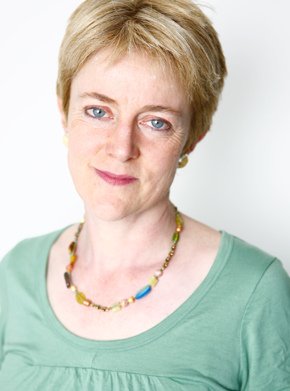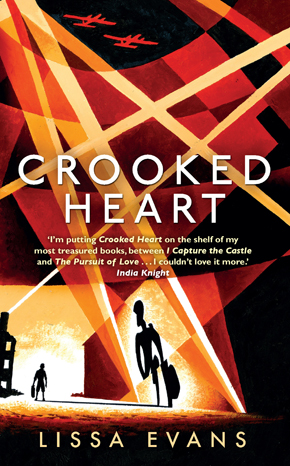Lissa Evans: Laughter in the dark
by Alex Peake-TomkinsonLissa Evans’ riotously comic Crooked Heart tells the story of bright ten-year-old orphan Noel Bostock, who is evacuated to St Albans from London to escape the Blitz. He is taken under the wing of sharp, unscrupulous Vera Sedge who, as soon as she claps eyes on Noel, hits on a flagrant new way to make money. Hilarious and tragic in equal measure, these vibrant and resourceful characters will leave you wanting more. She tells me how the novel came about, and what she’s planning next…
AP-T: Crooked Heart, like your previous novel – Their Finest Hour and a Half – is set on the home front during the Second World War, what drew you back to it?
LE: Their Finest Hour and a Half is about the making of a feature film, and I had a wonderful time doing the research – I read diaries, listened to taped voices, talked to people who’d worked on the 1942 film In Which We Serve, handled original scripts, watched a hundred films and dug through boxes of ephemera in the archives of the British Film Institute – there was just so much to read and see, so many contemporary accounts rich in detail and language and by the time I’d finished the book, I felt utterly immersed in the era; it was as if I was wearing a pair of 1940s lenses which transformed everything I looked at. I knew that I wanted to write another book about the home front.
The characters I ended up creating in Crooked Heart, however, were the type of people who lived unrecorded lives: petty criminals didn’t keep mass observation diaries and they weren’t interviewed for university archives. Theirs was an unobserved world, and I needed all of that immersive research to conjure it up; I couldn’t have written Crooked Heart first.
It’s quite a subversive, almost amoral book in many ways – was that always your intention?
It started with half an idea – a ‘respectable’ child, from a dull but moral background, being evacuated to a house full of chancers. I liked the idea of that juxtaposition, but it evolved into something far more complex. In some ways, it’s about what it means to be ‘good’, in others, it’s a redemption story.
It’s also a glimpse of a side of the war that existed in parallel with the honest slog with which most people faced the challenges of the home front. Life was tiring, tough and makeshift, and people had to adapt to the most enormous changes, almost on a day-to-day basis. And while there were heavy penalties for crimes such as looting, the general public were actually far more lenient in their views than the courts. They knew and understood the temptations…
The suffragette movement forms a thread through the book, was that important to you?
Noel has been brought up by his godmother Mattie, an ex-suffragette. Mattie seemed to emerge fully-formed; I didn’t have to plan her in advance – her opinions, outlook and language were already intact. I studied the Suffragettes at ‘O’ Level, and I think it left me with a base-line of knowledge that I topped up as the book progressed. I loved Mattie so much, however, that I want to write a prequel about her – to tell the story of how Noel came to live with her – so I’m going to need to do some in-depth research about the period between the wars.
At one point, one character says of a warden “I bet she’s the sort who always enjoyed shouting. The war’s just given her the chance to get paid for it.” Do you think the war created opportunities for people like that?
I think it created opportunities for a great many women (and men) who would otherwise have been living very narrow lives; for some it was a broadening of their experiences, or a chance to use skills they didn’t know they had – for others it was an utter transformation. In Crooked Heart, Vera Sedge (in her late thirties and stuck in a difficult domestic life) reflects on exactly this:
“The platform was full, the train fuller; a carriageload of ATS, big, plain, noisy girls, bulging out of their khaki. That’s where all the rations go, thought Vee. And they were so happy, with their bellowed conversations about men and dances, all nicknames and secret jokes and snorting abbreviations. Vee tried to imagine herself at eighteen, whisked off to learn how to mend trucks, everything found and not a whit of responsibility, a clean start, a new life on a platter. Heaven.”
There’s a surprising amount of violence in the book – were the scenes where characters physically confront each other difficult to write, technically?
Action scenes are all about making sure the reader understands precisely what’s going on – you lose all tension if someone has to check back over the last few sentences to work out the sequence of events. They’re about clarity and speed and precision – and when I’m writing them, I think I draw on my experience in TV editing. By way of contrast, I find interior monologues far more taxing to write: they’re the definitive glimpse of your characters; you have to get them exactly right. Dialogue is what I find easiest; I often speak it out loud as I write, trying to make sure that it sounds natural and believable, and absolutely in character.
The sadness of ten-year-old Noel is quite real, was it painful to write?
I’ve realised that I often write about ten-year-olds; the hero of my children’s book, Small Change for Stuart (as well as his triplet next-door neighbours) is ten as well. The reason for this, I think, is that I have a perfect mental snapshot of myself at that age; my family moved house, and I had to cope with a new town, a new school and the realisation that my ‘posh’ accent (i.e. southern) and fondness for long words marked me out as a freakish incomer. Like Noel, I internalised my unhappiness, so that although his experiences go far beyond my own small miseries, the tone of them wasn’t so difficult to catch.
Crooked Heart is very funny. Did that come easily or did you have to work at it?
Writing funny lines is both difficult and blissful. It’s something that is intrinsic to the way I write – I have always loved reading prose that made me laugh, and before I was a writer, I worked in radio and TV comedy, where part of my job as producer was to script edit. It was a brilliant training – both in developing the ability to polish and tighten, and also in learning to spot the moment when something is perfect, and needs no further adjustment.
Do you have favourite comic writers?
Oh, so many! J.P. Martin, Geoffrey Willans, Gerald Durrell, Jean Kerr, George and Weedon Grossmith, S.J. Perelman, Emlyn Williams, Evelyn Waugh, Somerville and Ross, Michael Green, Arthur Marshall, David Lodge, Kingsley Amis, Beachcomber… I discovered early on in my reading life that I loved writers who could make me laugh. Many of my early favourites – discovered in family bookshelves, or in the local library – are quite obscure now, but great chunks of their prose lodged in my head for ever, so that if I ever need an example of a perfectly crafted line, it’s there, waiting for me.
Are you looking forward to returning to Crooked Heart’s characters?
Yes. As well as the prequel, I’m going to write a sequel, set three years after Crooked Heart. I’ve already started the research…
 Lissa Evans has written books for both adults and children, including Their Finest Hour and a Half, longlisted for the Orange Prize and Small Change for Stuart, shortlisted for the Carnegie Medal, the Costa Book Awards and other prizes. Crooked Heart is published by Doubleday.
Lissa Evans has written books for both adults and children, including Their Finest Hour and a Half, longlisted for the Orange Prize and Small Change for Stuart, shortlisted for the Carnegie Medal, the Costa Book Awards and other prizes. Crooked Heart is published by Doubleday.
Read more.
Alex Peake-Tomkinson is a contributing editor at Bookanista and writes book reviews and features for the Mail on Sunday, the TLS and the Daily Telegraph.
@AlexPeakeTom


